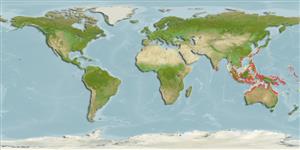Common names from other countries
>
Ovalentaria/misc (Various families in series Ovalentaria) >
Pseudochromidae (Dottybacks) > Congrogadinae
Etymology: Congrogadus: Latin, conger = conger + Latin, gadus = a fish, perhaps cod (Ref. 45335).
More on author: Richardson.
Environment: milieu / climate zone / depth range / distribution range
Ecologia
marinhas; estuarina associadas(os) a recifes; intervalo de profundidade 0 - 10 m (Ref. 90102). Tropical; 35°N - 25°S
Indo-West Pacific: Nicobar Islands, Andaman Sea and Japan to the tropical coasts of Australia.
Comprimento de primeira maturação / Tamanho / Peso / Idade
Maturity: Lm ?, range 20 - ? cm
Max length : 45.0 cm TL macho/indeterminado; (Ref. 3132)
Espinhos dorsais (total) : 0; Raios dorsais (total) : 68 - 74; Espinhos anais: 0; Raios anais : 57 - 66; Vértebras: 74 - 84. Coloration varied, capable of changing its color. Spots or blotches on body form reticulations and crossbands; paler ventrally. Gill membranes ventrally free from the isthmus. Posterior otic sensory canal pore present. Cephalic sensory canal pores not pigmented.
Inhabits coastal waters, often in brackish conditions (Ref. 48636). Found hidden amongst rocks or coral rubble (Ref. 48636). Reproductive activity appears to be cyclical and the species may not be a protogynous hermaphrodite (Ref. 2077). Also found in coral reefs among crevices (Ref 90102).
Ciclo de vida ou comportamento de acasalamento
Maturities | Reprodução | Spawnings | Egg(s) | Fecundities | Larvas
Winterbottom, R., 1985. Revision and vicariance biogeography of the subfamily Congrogadidae (Pisces: Perciformes: Pseudochromidae). Indo-Pac. Fish. (9):34 p. (Ref. 531)
Status na Lista Vermelha da UICN (Ref. 130435)
CITES (Ref. 128078)
Not Evaluated
Ameaça para os humanos
Harmless
Uso pelos humanos
Pescarias: espécies comerciais; Aquário: Espécies comerciais
Ferramentas
Relatórios especiais
Baixar XML
Fontes da internet
Estimates based on models
Preferred temperature (Ref.
115969): 25.2 - 29.3, mean 28.6 (based on 2277 cells).
Índice de diversidade filogenética (Ref.
82804): PD
50 = 0.5156 [Uniqueness, from 0.5 = low to 2.0 = high].
Bayesian length-weight: a=0.00389 (0.00180 - 0.00842), b=3.12 (2.94 - 3.30), in cm Total Length, based on all LWR estimates for this body shape (Ref.
93245).
Nível Trófico (Ref.
69278): 4.0 ±0.67 se; based on food items.
Resiliência (Ref.
120179): médio(a), tempo mínimo de duplicação da população 1,4 - 4,4 anos (Preliminary K or Fecundity.).
Fishing Vulnerability (Ref.
59153): Low to moderate vulnerability (35 of 100).
